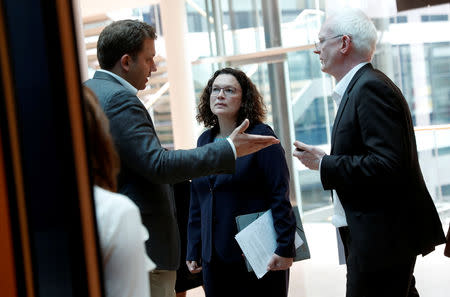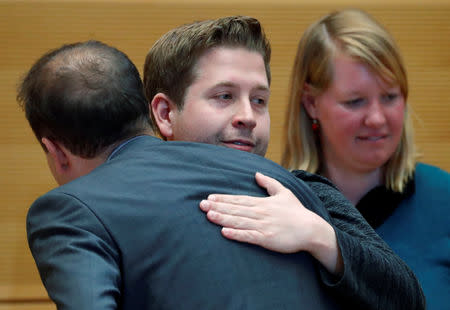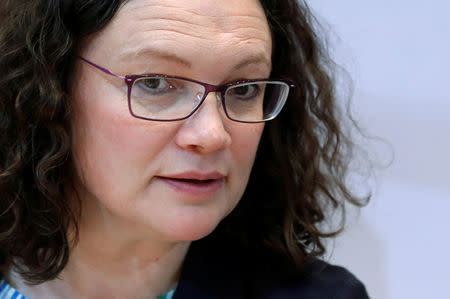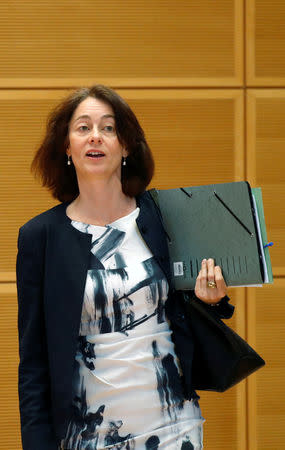German's SPD to review coalition strategy after vote rout
By Madeline Chambers
BERLIN (Reuters) - Germany's Social Democrats called a crisis meeting for next week to discuss strategy after a disastrous election triggered a warning from the party's left that it may soon be time to ditch a coalition with Angela Merkel's conservatives.
The SPD suffered a double humiliation on Sunday. Defeated in a regional vote in the northern state of Bremen for the first time in 73 years, they also saw their share of the vote slide more than 11 points to 15.8% in EU parliamentary elections, behind the Greens.
"For the first time, we came third in a national vote and that is a crunch moment for us all," leader Andrea Nahles told reporters. "The seriousness of the situation is completely clear to everyone."
She announced a retreat on June 3 where senior party members would discuss electoral strategy and how to stand out from Merkel's conservatives on issues such as climate change and social policies, including pensions.
They will also agree how to gauge the coalition's success later this year when the SPD reviews its role, she said.
Nahles, under intense pressure to deliver electoral success or forfeit her job, has made clear that for now, the party will stay in government.
Any move to pull out could trigger snap elections or a possible new coalition. Three more regional elections take place in September and October, all in former Communist eastern states where the far-right Alternative for Germany (AfD) is strong.
Both options are unappealing to the SPD and conservative leadership and could hasten the departure of Merkel who has already handed the leadership of her Christian Democrats (CDU) to Annegret Kramp-Karrenbauer.
The election setbacks fuelled discontent among many members of the SPD who want to ditch their second consecutive stint as junior partner under Merkel. They want the party to reinvent itself in opposition and rediscover its leftist roots.
SPD deputy leader Ralf Stegner, SPD youth wing leader Kevin Kuehnert and lawmaker Matthias Miersch called on the party to have the courage to change tack.
"The grand coalition has an end date: at the latest, September 2021 and if needed sooner. We have not signed up for a (long-term) subscription with the conservatives," they said, referring to the date when the next federal election is due.
The SPD response to the election humiliation heralds turbulence in a coalition already beset by infighting. It nearly collapsed last year due to rows over migrant policy and the sacking of the head of domestic intelligence.
Despite its historic strength in industrial and mining regions, the SPD signalled it would address concerns about climate change reflected in the success of the Greens in the European vote.
"We need more commitment on climate protection. I cannot take responsibility for further delays," SPD Environment Minister Svenja Schulze tweeted.
The government is wrangling over a package of climate protection rules and discussing ways to price CO2.
Critics say plans to phase out coal-fired power production by 2038 lack ambition and that more must be done to boost demand for electric vehicles after Germany's powerful car industry tries to recover from a diesel emissions cheating scandal.
(Additional reporting by Christian Kraemer and Paul Carrel; Editing by Andrew Heavens and Alison Williams)





